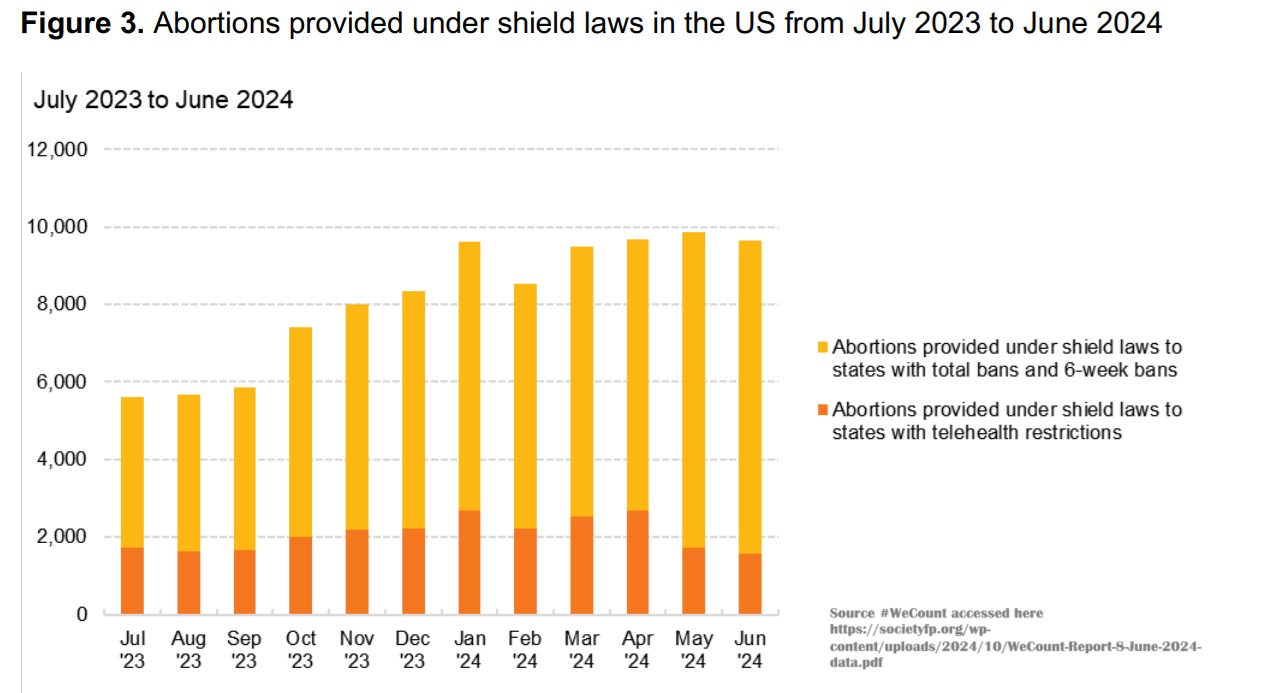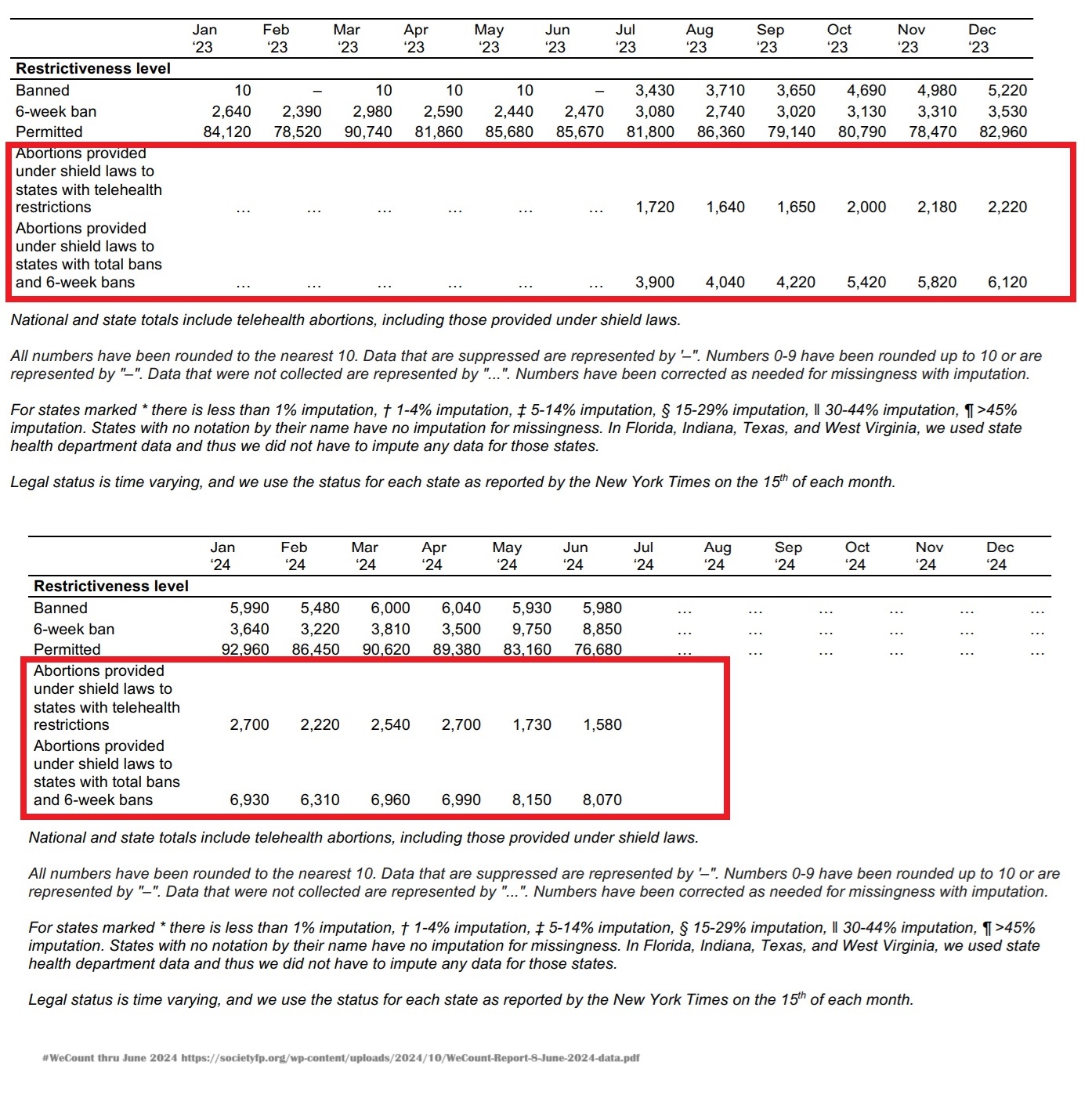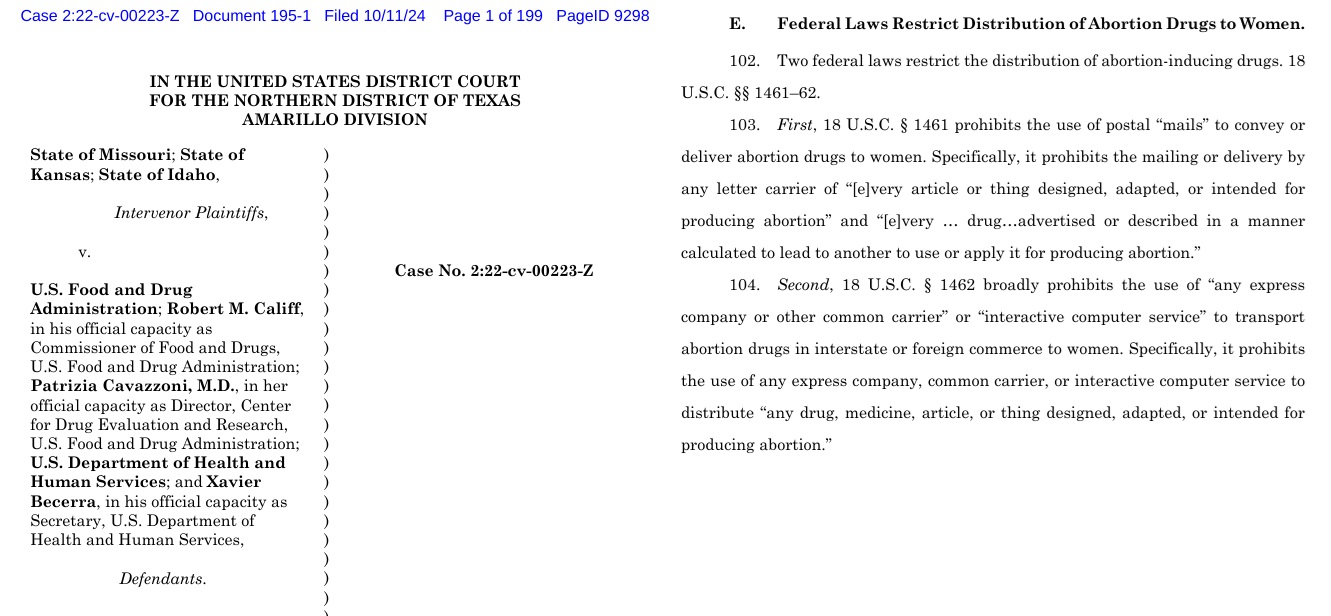A Comstock Act showdown could lead to a United States Supreme Court battle over abortion as states pressure various Courts to enforce the federal law, which prohibits the mailing of “any article, instrument, substance, drug, medicine, or thing [that] may, or can, be used or applied for producing abortion.”
Currently, abortion pills are flooding into states that restrict abortion, sent illegally from abortion providers in outside states who are protected under so-called ‘shield laws’. As of August 2024, the Williams Institute claimed there are “23 states and Washington, D.C.” which “have shield law protections related to reproductive health care.”
DOJ “memorandum” focuses on illegal intent of sender
The Comstock Act should be applied where the sender “intends [the items] to be used unlawfully” despite a 2022 Department of Justice (DOJ) Memorandum’s claim to the contrary.
In December of 2022, a “Memorandum Opinion for the General Counsel United States Postal Service” authored by the Assistant AG for the Office of Legal Counsel, Christopher H. Schroeder, attempted to answer “whether section 1461 of title 18 of the United States Code” (otherwise known as the Federal Comstock Act) “prohibits the mailing of mifepristone and misoprostol…”
That slip opinion argued that the long-held Comstock Act did not apply where “the sender lacks the intent that the recipient will use them unlawfully.” This key phrase, “intends them to be used unlawfully” appears to indicate that the Comstock Act could be applicable when the sender mails abortion-inducing drugs where they are intended to be used “unlawfully.”
Footnotes in the DOJ’s 2022 memorandum on the Comstock Act suggested that the “sender’s intent” is the focus of the law, while also acknowledging that “some states have independently enacted laws to restrict the mailing of these drugs for abortion purposes within their jurisdiction.”
Despite this distinction, Schroeder’s memorandum claimed that because abortion-inducing drugs could have other uses, the “mere mailing of such drugs to a particular jurisdiction is an insufficient basis for concluding that the sender intends them to be used unlawfully.”
“Federal law does not prohibit the use of mifepristone and misoprostol for producing abortions…” the DOJ opinion suggested. “This is true even when the drugs would be delivered to an address in a jurisdiction with restrictive abortion laws, because women who receive the drugs in all fifty states may, at least in some circumstances, lawfully use mifepristone and misoprostol to induce an abortion.”
As such, the DOJ’s opinion stated that “those sending or delivering mifepristone and misoprostol typically will lack complete knowledge of how the recipients intend to use them and whether that use is unlawful under relevant law.”
The only problem with this statement is that abortion providers in multiple states are admittedly shipping the drugs “unlawfully” into states that prohibit them or restrict telehealth dispensing.
🚨PLEASE SHARE🚨
Do you live in a state that bans abortions? With the help of mail-forwarding, you can still get safe, effective abortion pills from a doctor in days.
RT this thread to spread the word—so the people who need help learn how they can get it: pic.twitter.com/55kdyLGFCi
— mayday.health (@HealthMayday) June 24, 2022
A FOIA request by journalists at The Intercept uncovered that drug-sniffing police dogs in states like Mississippi (which has pro-life protections in place) recently intercepted unregulated abortion drugs coming into the state from outside the country.
“The pink-envelope investigation came out of a sort of collaboration between the feds’ regional offices and a local official: U.S postal workers and a city K-9 cop. Though no one in Mississippi has yet been arrested for helping carry out an abortion,” The Intercept reported.
Despite this frightening scenario, the DOJ opinion insisted that “even when a sender or deliverer of mifepristone or misoprostol, including USPS, knows that a package contains such drugs—or indeed that they will be used to facilitate an abortion—such knowledge alone is not a sufficient basis for concluding that section 1461 has been violated,” DOJ wrote.
“Accordingly, USPS could not reasonably assume that the drugs are nonmailable simply because they are being sent into a jurisdiction that significantly restricts abortion,” wrote the DOJ.
But pro-life attorney Mike Seibel holds a different view, suggesting that politics not judicial integrity was at play, “My initial reaction is that this is merely an opinion of the Biden DOJ, which will likely not prosecute under this federal law,” Seibel said. “However, when a new administration is elected, that DOJ may see it differently. Without actual litigation in the courts, this appears to be simply a political move to protect abortion.”
Despite Comstock, abortion pills ‘illegally’ flood pro-life states
Despite the federal Comstock Act remaining active, abortion pills continue flooding into states that either restrict abortion or fully protect preborn children except when the life of the mother is at risk. As such, states are struggling to enforce their own laws.
Shield laws, which protect abortion providers who mail abortion drugs into states that restrict the procedure do not protect women. Shield laws have been credited for 40,000 abortion pill shipments to women in the last half of 2023, according to a #WeCount report from May 14, 2024.
An October 2024 report published by #WeCount claimed that because of shield laws, nearly 100,000 preborn human beings were killed, despite state pro-life laws, between July of 2023 and June of 2024.
#WeCount is sponsored by the pro-abortion Society of Family Planning, which was founded in 2005 with contributions from the Packard Foundation, and is heavily funded by both the Packard and Susan Thompson Buffett Foundations (Warren Buffett). These foundations financed abortion pill manufacturer Danco Laboratories in its early days.
In its October 2024 report, #WeCount revealed that “In April-June 2024… an average of over 7,700 monthly telehealth abortions [were] provided under shield laws to people in states with total abortion bans or 6-week bans [23,210] and nearly 2,000 monthly telehealth abortions provided under shield laws to people in states with restrictions [6,010] that explicitly ban telehealth abortion or implicitly preclude telehealth due to in-person visit requirements.” The report added, “This amounts to an average monthly number of telehealth abortions provided under shield laws in April-June 2024 of over 9,700.”

WeCount abortions provided under state shield laws 2023 to early 2024 2
Starting in July 2023, #WeCount’s report claimed it “began to include abortions provided by licensed clinicians in states with shield laws in place. Shield laws give some legal protections to clinicians who offer abortion care via telehealth to people living in states with total abortion bans, with 6-week bans, or with laws that explicitly or implicitly preclude a component of telehealth abortion, such as requiring in-person ultrasounds,” #WeCount wrote. “In this report, for the first time, we provide data on the number of abortions provided under shield laws by state, including for states with abortion bans and restrictions.”
#WeCount estimates indicated that between July 2023 and June 2024:
- Nearly 25,000 abortions (24,880) were “provided under shield laws to states with telehealth restrictions.”
- Nearly 73,000 abortions (72,930) were “provided under shield laws to states with total bans and 6-week bans.”
In other words, while the U.S. Supreme Court in the Dobbs v Jackson Women’s Health Organization case that overturned Roe v. Wade granted states authority to regulate abortion, shield laws enacted in abortion-liberal states are usurping laws in abortion restrictive states — leading to a showdown of sorts over the Comstock Act.

#WeCount abortion estimates provided under state shield laws 2023 to June 2024
Lawsuit: Three States Request Enforcement of Comstock Act
As Live Action News previously documented, Missouri, Kansas and Idaho filed a lawsuit on October 14, 2024, in Amarillo, Texas, asking the Courts to weigh in on the expansion of the abortion pill. The plaintiffs in State of Missouri; State of Kansas; State of Idaho v. FDA are also requesting that the Courts enforce the Comstock Act and grant them the ability to “vindicate [their] sovereign, quasi-sovereign, and proprietary interests, including [their] interests in protecting [their] citizens.”
In the lawsuit, the Plaintiff states allege that abortion pills (namely mifepristone 200mg) come with significant dangers, and therefore, “Women face severe, even life-threatening, harm because the federal government has disregarded their health and safety.” They add that the FDA’s decision to allow mail order abortions has resulted in “These dangerous drugs… flooding states like Missouri and Idaho and sending women in these States to the emergency room.”
The Plaintiff states suggested that the FDA was reckless in disregarding the Federal Comstock Act in its expansion of the drug.
“The FDA’s decision to eliminate the in-person dispensing protection failed to account for or address the federal laws that prohibit the distribution of abortion drugs by postal mail, express company, or common carrier and by interactive computer service… Instead, through its words and actions FDA permitted and sometimes even encouraged these illegal activities. But a federal agency cannot authorize unlawful actions,” the lawsuit stated.

Three states sue FDA allege illegally allowed abortion pills by mail against Comstock Act
“Because a federal agency cannot permit what federal law expressly prohibits, the FDA lacked legal authority,” the Plaintiff states claimed. The suit accuses the FDA of failing “to account for or address the federal laws that prohibit the distribution of abortion drugs by postal mail, express company, or common carrier and by interactive computer service.”
New Mexico Lawsuit Could Become a Potential Comstock Act Challenge to U.S. Supreme Court
Surprisingly, perhaps the challenge most likely to succeed regarding the Comstock Act could come the pro-abortion state of New Mexico. That lawsuit originated in 2023 after the cities of Clovis and Hobbs passed Sanctuary Cities for the Unborn Ordinances, requiring abortion providers to comply with federal law — namely the Comstock Act.
Immediately after the ordinances passed, New Mexico Attorney General Raul Torrez, who has been endorsed by Planned Parenthood, requested and received an Emergency Petition for Writ of Mandamus and Request for Stay from the New Mexico Supreme Court, halting implementation of the ordinances. The state legislature then passed HB7, essentially declaring any ordinance that violates the state’s “Reproductive and Gender-Affirming Health Care Freedom Act” as null and void.
Despite the AG’s lawsuit, the City of Eunice moved forward final passage of its ordinance on the same day the New Mexico AG filed suit. The City of Eunice then sued Governor Michelle Lujan Grisham and AG Torrez, setting the stage for a showdown that could make its way to the United States Supreme Court. Oral arguments at the New Mexico Supreme Court were heard in December and a decision has not yet been rendered.
Attorney Mike Seibel, who is representing the City of Hobbs in the case, told Live Action News that “The Supreme Court of New Mexico heard oral arguments on the Hobbs ordinance, which seeks to enforce the Comstock Act, and my clients are awaiting the decision. Given the liberal makeup of the Court, we are anticipating an appeal to the United States Supreme Court on the Comstock law.”
Supreme Court Hints Comstock Could Be at Play
Should a U.S. Supreme Court challenge on the Comstock Act be submitted, there is indication that Supreme Court Justices would accept the case.
At least two Justices previously hinted that the Comstock Act could be in play during oral arguments in the Alliance for Hippocratic Medicine (AHM) v. Food and Drug Administration (FDA) lawsuit, which challenged the legitimacy of the FDA’s recent expansions of the abortion pill. While not ruling on the merits of the case, the Court later ruled that the Plaintiffs did not have standing.
However, during arguments in the case, Justice Clarence Thomas grilled attorney Jessica Ellsworth, who represented abortion pill manufacturer Danco Laboratories, on why the FDA did not take into account the Comstock Act when it approved mail-order distribution of the drug.
“How do you respond to an argument that mailing your product and advertising it would violate the Comstock Act?” Justice Thomas asked Danco’s attorney.
Ellsworth dodged the question, warning Justice Thomas that challenging the FDA could “invit[e] mischief,” and that the Court should “think hard” about that.
“My problem is, you’re private,” Thomas stated, suggesting that private entities are not subject to a “safe harbor” against federal laws.
In addition to Thomas, Justice Samuel Alito also questioned why the FDA “had not contended with the law in its decisions on expanding access to mifepristone through the mail,” wrote The Hill.
“Shouldn’t the FDA at least considered the application of 18 USC 1461?” Alito asked the FDA. “This is a prominent provision; it’s not some obscure subsection of a complicated, obscure law. They knew about it. Everybody in this field knew about it. Shouldn’t they have at least addressed it?”
Donald Trump doesn’t need to sign a law to ban abortion nationwide. Trump could try to weaponize and misuse old and outdated Comstock laws to ban abortion — without Congress. pic.twitter.com/oAkctPNw6k
— Planned Parenthood Action (@PPact) October 18, 2024
The once-obscure Comstock Act is sure to make plenty of news in upcoming months as pro-abortion forces call for the law’s repeal, while pro-life states continue to fight for it to be fully enforced.







